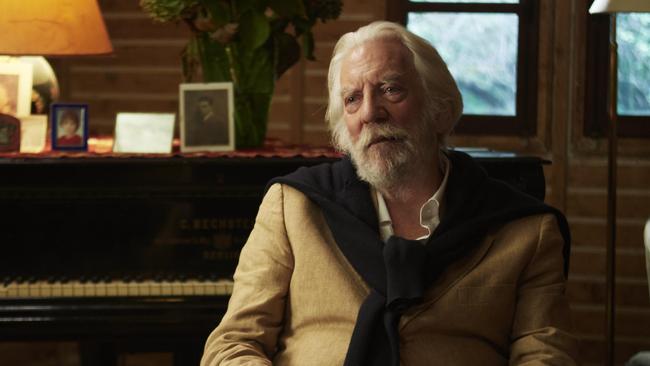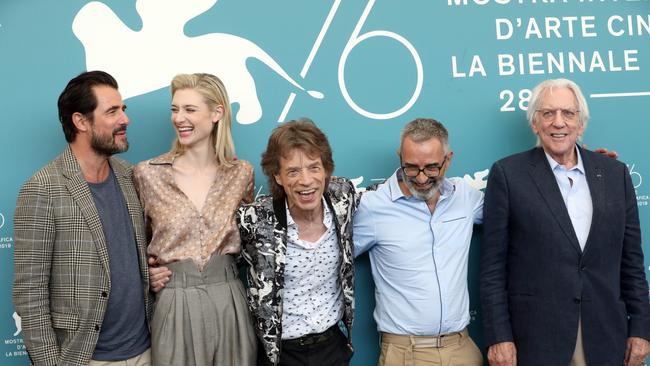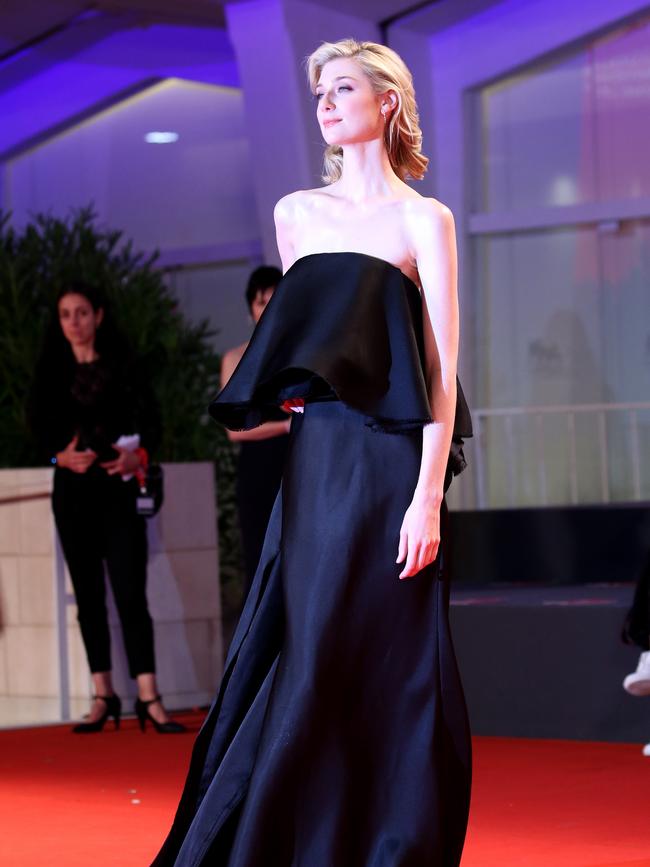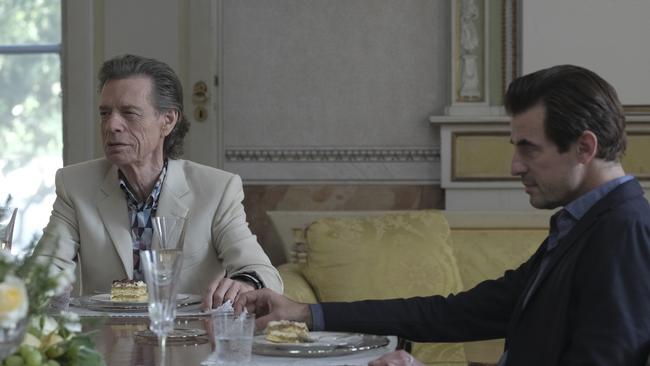Donald Sutherland plays a legend in The Burnt Orange Heresy
You can’t really direct Donald Sutherland, not in the usual way at least, says Italian filmmaker Giuseppe Capotondi.

You can’t really direct Donald Sutherland, not in the usual way at least, says Italian filmmaker Giuseppe Capotondi, who cast the actor in his elegantly suspenseful drama, The Burnt Orange Heresy. “You cannot tell him on the day, on set, ‘make it bigger’ or ‘make it smaller’,” Capotondi says. He’s Donald Sutherland, you know, you have to trust his instincts.”
Sutherland’s character, Jerome Debney, a legendary, reclusive artist, embodies the mysteries at the heart of The Burnt Orange Heresy, a film about art, ambition and misdirection with a cast that also includes Mick Jagger, Australian star Elizabeth Debicki and Claes Bang. Sutherland was more than ready to work on the intricacies of character and motivation, Capotondi is quick to add. There was preparation work, fixing on small, telling details. They spoke “about the way he’s dressed, the way he moves, should he have a cane or not, all that”. And then, on set, he was ready for the moment,
Debney is a famous artist whose work is shrouded in mystery. The value of his art is in its absence: all his paintings were lost in two fires. He has been out of the public eye for decades. It seems he has picked up a brush again, in secret, yet he remains unwilling to share his art with the public, or the critics, or anyone at all. Capotondi asked Sutherland, who is 85, his thoughts on Debney’s attitude to his art, and the actor told him,
“He’s 84, he can do whatever he wants; he doesn’t have to justify himself to anyone.” This makes sense to Sutherland, Capotondi suggests. “I think that resonates with him because he has reached a point in his life where he can do whatever he wants.”
Most of The Burnt Orange Heresy was shot in Italy, and much of it takes place in a villa on the shores of Lake Como.
In Sutherland’s long career, he’s worked several times in Italy: he took the title role in Fellini’s Casanova, he was a brutal fascist in Bertolucci’s 1900, and in Nicolas Roeg’s Don’t Look Now he was the father haunted by loss and death in Venice.
It was Venice where The Burnt Orange Heresy had its world premiere. The movie is a reflection on the nature of truth, in a world in which everyone lies — or they might be lying, or they have omitted a crucial detail about their past that changes everything about who they are — none of which is immdiately apparent

This a movie about an ambitious man, a mysterious woman, a wealthy collector and the enigmatic artist played by Sutherland; four people whose lives revolve around a question of authenticity that ultimately becomes a matter of life and death.
This stylish set-up for a thriller explores an unsettling, universal issue, says Capotondi.. “To me this film is about the perception of truth, and how easy it is to create a new narrative and sell it as the real thing.” The movie also poses a question he often asks himself, ruefully and with a degree of uncertainty as to the answer: “Is there anybody still interested in the truth, do we really want it, or do we just want to believe what’s easy for us?” Art and its perceived value drive much of the narrative; yet, says Capotondi, “it could have been set in any other field, politics or journalism or finance — any place where someone has the power to manipulate the perception of truth”. The art world “has more mystique” and it lends itself to cinematic storytelling.
The world of modern or contemporary art, he suggests, has ceded a good deal of power to the critic. “When you need some guidance to read a painting or a piece of art, it makes the role of the critic even more important.”
Events in The Burnt Orange Heresy are set in train by precisely this question: it’s presented to us at a public lecture given by James Figueras (Bang), art critic at large, who has designed a playful, somewhat glib demonstration of the point. The script originally showed James delivering a lecture to a group of tourists in Milan: Capotondi decided to break up the 10-page scene, to show James rehearsing his talk, finetuning seemingly offhand remarks and pauses, then intercutting these scenes with the delivery of the speech itself to an initially captivated audience — until the rug is pulled out from under them.
We see James as man who seems to know a lot about art, who can work a crowd, yet also relishes pulling a fast one and revelling in the deception. After the lecture, only one person hangs around: Berenice (Debicki), a cool, enigmatic young woman who’s a conundrum from the first moment: small-town innocent or femme fatale; conniver or truth-teller? Or both?
Bang — a Danish actor who came to international prominence in The Square, Ruben Ostlund’s 2017 Oscar-nominated, Palme d’Or-winning feature — and Debicki have an intriguing rapport on screen. “Elizabeth is young, Claes is in his 50s, so he has more experience, but I think they both know their skills: where the camera is, and how to push and when to stop pushing. They are not only very talented but also very clever,” Capotondi says. Whereas Sutherland, as Debney, was the last to be cast; Debicki was the first.
Capotondi can’t say enough about the Australian actor who almost stole the show as Jordan Baker in Baz Luhrmann’s The Great Gatsby, and has gone on to roles in films like The Man From UNCLE (as an imperious, tightly wound villain) and Widows (in which she plays an abused wife who becomes part of an all-female heist team), as well as appearing in local productions such as The Kettering Incident and Breath. She will soon be seen in the forthcoming Christopher Nolan blockbuster, Tenet.

“Elizabeth will be a major star, she’s on the rise so much, and she deserves it all, she’s amazing,” Capotondi says. “We became friends, we see each other in London all the time.” He’d love to work with her again, to bring out a quality he feels she hasn’t had the chance to explore enough on screen. “She’s very funny too. I really want to do some comedy with her.”
The connection between Bang and Debicki’s characters is immediate and intense, but it looks as if they’re going to part company the morning after they spend the night together. But he suggests she might like to stay with him a little longer, and accompany him on a visit to a famed art collector who has a villa on Lake Como. On the journey there, the game-playing doesn’t let up. “Is your name really Berenice?” James asks. “Why would I make that up?” she replies. This doesn’t really answer the question, he points out; she agrees, and the journey continues.
At the villa, they are both temporarily taken aback by the effortless luxury, the quality of the art on the walls, and the man who has invited them there: Joseph Cassidy, played by Jagger, who has a very particular reason for making contact with James which gradually becomes clear — on the grounds of the estate, it turns out, Jerome Debney is living and working, in great secrecy.
Cassidy makes James an offer, a Faustian bargain the terms of which reveal that he’s done some research, and found some skeletons in James’s closet. He offers James a shot at “redemption”, the chance to be the first critic to interview Sutherland’s Debney in more than 50 years. But there is a price, he makes clear, and he applies the pressure expertly.
James and Berenice meet the courtly, guarded Debney, who appears to be aware of some aspects of the bargain, and prepared to engage with James up to a point. He’s a man who speaks in formal, poetic phrases, well aware of the power he wields. He is also drawn to Berenice, whom he seems to perceive as vulnerable. “Most things, most people, are not what you’d expect.” he says. And so a new game is set in motion, one that increasingly suggests diverging paths for James and Berenice, as moral dilemmas and choices come to the surface.
Capotondi’s 2009 first feature, the Italian-language psychological thriller, The Double Hour, had caught the attention of producers of The Burnt Orange Heresy — which is based on a book by Charles Willeford, a chronicler of American life, who wrote several dark, satirical crime novels.
His story is set in Palm Beach, but Capotondi decided to transfer the film to an Italian setting. Florida is expensive: Palm Beach, “because of Trump being there most of the time, is no good,” Capotondi says. Moving the story Lake Como, “brings something that will match the story and the sophistication of the dialogue”. In this location, he says, “direct sunlight rarely gets there, so you get this darkness even if it’s not cloudy, and I thought it would have helped give the moodiness I was looking for”. He liked the idea of suggesting “a film noir from the 1940s, with beautiful actors who look like old film stars, much like To Catch a Thief”, Hitchcock’s tale of a cat burglar and a socialite on the French Riviera, starring Cary Grant and Grace Kelly.

Each of his actors, he says, brought very different qualities to the project. Jagger, whose movie roles include Performance and Ned Kelly, hadn’t been on screen since The Man From Elysian Fields in 2001. “He hasn’t done anything for 20 years but I think he’s a very good actor, and he had a difficult role,” Capotondi says. Cassidy is, as more than one reviewer has noted, a man of wealth and taste. He likes to be in control, yet seem casual and relaxed.
He’s a man who understands power. It’s a smaller role, says Capotondi, but significant. “He has to be charming, seductive. And he has the most important line of all, the very last line of the film.”
The Burnt Orange Heresy is screening in cinemas nationally, with the exception of Victoria. It will release in Victorian cinemas on a date to be confirmed.

To join the conversation, please log in. Don't have an account? Register
Join the conversation, you are commenting as Logout